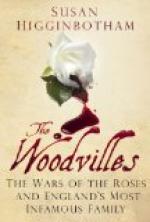The best known of Shakespeare’s allusions to England are no doubt those splendid outbursts of patriotism which occur in King John, and Richard II, and Henry V. And of these the dying speech of John of Gaunt, in Richard II, is the deepest in feeling. It is a lament upon the decay of England, ‘this dear, dear land’. Since we began to be a nation we have always lamented our decay. I am afraid that the Germans, whose self-esteem takes another form, were deceived by this. To the right English temper all bragging is a thing of evil omen. That temper is well expressed, where perhaps you would least expect to find it, in the speech of King Henry V to the French herald:
To
say the sooth,—
Though ’tis no wisdom to confess
so much
Unto an enemy of craft and vantage,—
My people are with sickness much enfeebled,
My numbers lessened, and those few I have
Almost no better than so many French;
Who, when they were in health, I tell
thee, herald,
I thought upon one pair of English legs
Did march three Frenchmen. Yet, forgive
me, God,
That I do brag thus! This your air
of France
Hath blown that vice in me; I must repent.
Go therefore, tell thy master here I am:
My ransom is this frail and worthless
trunk;
My army but a weak and sickly guard;
Yet, God before, tell him we will come
on,
Though France himself and such another
neighbour
Stand in our way. There’s for
thy labour, Montjoy.
Go bid thy master well advise himself:
If we may pass, we will; if we be hindered,
We shall your tawny ground with your red
blood
Discolour; and so, Montjoy, fare you well.
The sum of all our answer is but this:
We would not seek a battle as we are;
Nor, as we are, we say we will not shun
it;
So tell your master.
That speech might have been written for the war which we are waging to-day against a less honourable enemy. But, indeed, Shakespeare is full of prophecy. Here is his description of the volunteers who flocked to the colours in the early days of the war:
Rash inconsiderate fiery voluntaries,
With ladies’ faces and fierce dragons’
spleens,
Have sold their fortunes at their native
homes,
Bearing their birthrights proudly on their
backs,
To make a hazard of new fortunes here.
In brief, a braver choice of dauntless
spirits
Than now the English bottoms have waft
o’er
Did never float upon the swelling tide.
And here is his sermon on national unity, preached
by the Bishop of
Carlisle:
O, if you rear this house against this
house,
It will the woefullest division prove
That ever fell upon this cursed earth.
Prevent it, resist it, let it not be so,
Lest child, child’s children, cry
against you ‘Woe!’
The patriotism of the women is described by the Bastard in King John:




